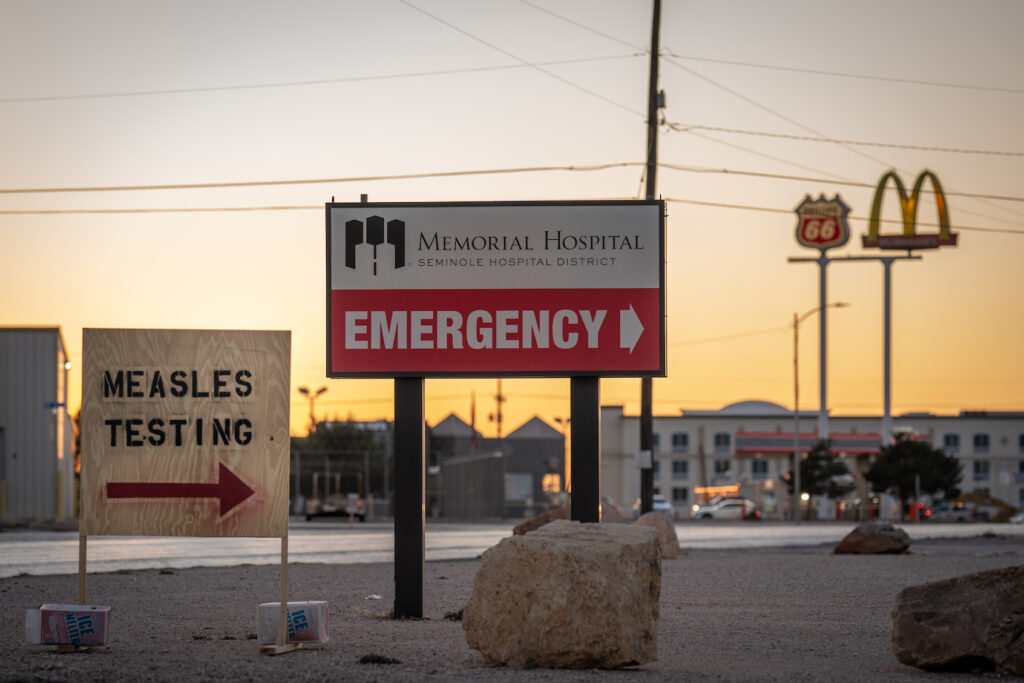
SEMINOLE, TEXAS - FEBRUARY 27: Signs point the way to measles testing in the parking lot of the Seminole Hospital District across from Wigwam Stadium on February 27, 2025 in Seminole, Texas. Eighty cases of measles have been reported in Gaines county with one death reported. (Photo by Jan Sonnenmair/Getty Images)
Canada has officially lost its designation as a “measles-free” country due to a significant outbreak that has infected thousands over the past year. On November 10, 2025, the Pan American Health Organization (PAHO) announced this change after its measles elimination commission reviewed public health data in Mexico City. The ongoing outbreak highlights a troubling decline in vaccination rates across Canada and other nations, raising concerns that the United States may soon follow suit.
The PAHO’s decision underscores the highly contagious nature of measles. Despite the availability of effective vaccines, a decrease in childhood vaccination rates has left many children unprotected. Kathryn H. Jacobsen, a global health epidemiologist, noted that the resurgence of measles in Canada is not an isolated incident. The U.S. has encountered large outbreaks this year, which could lead to the loss of its measles-free status as well.
Measles is one of the most infectious diseases globally. Before the vaccine was introduced in 1963, nearly every child contracted measles, resulting in over 2 million deaths annually. The introduction of the vaccine drastically reduced these numbers; by 1968, cases in the U.S. had plummeted by more than 95%. Despite this progress, approximately 100,000 children continue to die from measles each year due to lack of access to vaccines, particularly in low-income countries.
To achieve measles elimination status, a country must have no local transmission of the disease for a minimum of one year. If local transmission resumes, as seen in Canada, the status is revoked. Since 1998, Canada had maintained its measles-free status, with the U.S. joining in 2000. However, as vaccination rates have declined, the risk of outbreaks has grown.
In Canada, the proportion of two-year-olds receiving at least one dose of the measles vaccine fell from approximately 90% in 2019 to around 82% in 2022 and 2023. This decline contributed to a surge in cases, with Canada reporting over 5,000 measles infections in 2025, a stark increase from just 16 cases between 2020 and 2023. Tragically, two infants died from the disease during this period.
The situation in the U.S. is also alarming. More than 1,600 Americans across over 40 states contracted measles in 2025, marking the highest number of cases since 1992. An outbreak that began in Texas in January infected over 760 individuals and resulted in two fatalities. More than 90% of those affected were unvaccinated. In Mexico, thousands of cases have also been reported, primarily among unvaccinated populations.
While Central America, South America, and the Caribbean currently maintain their measles-free status, the outbreaks in North America pose a risk of spreading to these regions. The decline in public trust regarding health messaging and vaccinations is a significant factor contributing to the resurgence of measles. Without substantial improvements in vaccination coverage and public confidence in health measures, many countries could face larger outbreaks of measles and other vaccine-preventable diseases in the near future.
The loss of measles-free status in Canada and the anticipated decline in the U.S. reflect broader issues in public health and vaccination efforts. Restoring community trust and improving vaccination rates are critical steps needed to prevent further outbreaks and protect public health.







